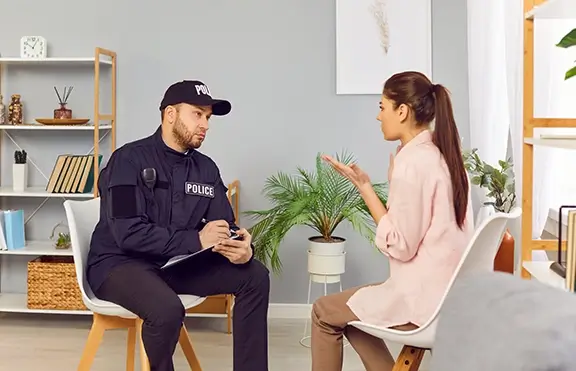Across the United States, there are thousands of interactions between police officers and residents every day. Some of these encounters go smoothly, while others can become confusing or tense—especially for immigrants who are still learning about U.S. laws and expectations.
Knowing your rights isn’t just about legal protection; it’s about feeling safe, confident, and prepared. This guide will walk you through what to expect during different types of encounters, how to respond calmly, and where to turn for help if needed.
Why Knowing Your Rights Matters
Police interactions can be stressful, especially if English is not your first language or you are unfamiliar with U.S. law. Understanding your constitutional rights can make these encounters less intimidating and help prevent misunderstandings. In recent years, there have been widely reported cases where confusion during police encounters led to legal problems or even harm. By learning your rights now, you can better protect yourself and your loved ones.
For more resources on navigating U.S. laws as an immigrant, read our guides on 9 Responsibilities of a US Citizen You Need to Know and 13 Benefits of US Citizenship for Immigrants.
General Rules During Any Police Encounter
When approached by a law enforcement officer, remain calm and collected. Speak clearly and politely, even if you feel upset or confused. Keep your hands visible at all times. If you are in a vehicle, place your hands on the steering wheel with the internal light on if it is dark. This signals to the officer that you are not a threat and helps reduce tension.
Key steps to remember:
Ask if you are free to leave. If yes, walk away calmly.
If you choose not to answer questions, say, “I want to remain silent.”
You may refuse consent to a search of your person, bags, or car unless there is a warrant or probable cause.
Provide accurate identifying information if requested, like your name and birth date.
Do not physically resist or argue on the street; you can challenge actions later through legal channels.
When You Are Stopped on the Street
If you are stopped in a public space, stay calm and assess the situation. Politely ask, “Am I free to leave?” If the answer is yes, you may calmly leave the area. If the officer says no, it means you are being detained. Even while detained, you can continue to remain silent and refuse to answer questions until you have spoken to a lawyer.
Practical tips:
Keep your hands visible and move slowly.
Do not consent to a search of your pockets or bag unless legally required.
Avoid sudden movements or reaching into pockets without telling the officer first.
If you want to document the encounter, step back to a safe distance and record if your state law allows it.
If You Are Pulled Over While Driving
Traffic stops are one of the most common police interactions. If you are pulled over, safely move your vehicle to the side of the road and turn on your hazard lights. Remain seated with both hands on the steering wheel until the officer approaches. Provide your driver’s license, vehicle registration, and proof of insurance when requested. Avoid making sudden movements, as these can be misinterpreted.
Checklist for a smoother stop:
Lower your window and follow instructions calmly.
Keep your hands visible; at night, turn on the interior light.
Only reach for documents after the officer asks and you have told them where they are.
You do not need to discuss travel plans or answer unrelated questions.
If asked to search your car, you may say, “I do not consent to a search.”
For more information on driving requirements, visit your state DMV site. You may also find helpful tips in our guide on Welcome to the United States – A Guide for New Immigrants which discusses related rules for families adjusting to life in the U.S.

If You Are Arrested or Detained
Being arrested can be frightening, but staying calm is critical. Do not resist arrest, even if you believe it is a mistake. Clearly state that you want to remain silent and request a lawyer immediately. You have the right to make local phone calls, so it’s a good idea to memorize key phone numbers for family members or attorneys.
What to do next:
Provide only basic identifying information at booking; wait to answer other questions until your lawyer is present.
Ask for medical attention if you feel unwell or have injuries.
Keep track of any personal property taken and request a receipt.
If you do not understand English well, request an interpreter.
At the police station, you may be asked for basic information such as your name and address. Beyond this, do not answer additional questions without your lawyer present. For information about healthcare services under emergency situation, see our guide on What is Urgent Care? Understanding This Healthcare Option.
How to File a Complaint
If you believe that a law enforcement officer acted improperly, you have the right to file a complaint. Many cities have a civilian complaint board or an internal affairs division that reviews these cases.
Steps to prepare and submit a complaint:
Write down the date, time, and location of the incident as soon as you can.
Note officers’ names, badge numbers, and any patrol car numbers.
Collect names and phone numbers of witnesses willing to speak about what they saw.
Save photos, videos, or other evidence in a safe place.
Submit your written complaint online or in person, following your city’s procedure.
For legal support, organizations such as Legal Services Corporation can provide guidance. If financial costs are a concern, our articles on How to Shop for Food and Essentials in the U.S. – Where to Find the Best Deals and 6 Smart Tips for Furnishing Your Apartment on a Budget in the U.S. include budgeting ideas that help families manage unexpected expenses.
Document Everything
Careful documentation can protect you if questions arise later. If it is safe to do so, take photos of any injuries or damaged property. Keep copies of citations, reports, and any paperwork related to the encounter. Write down everything you remember, including what the officer said and how you responded.
Helpful reminders:
Store notes and digital files in two places (for example, your phone and cloud storage).
If you record the interaction, learn your state’s recording laws first.
Ask for incident or case numbers before you leave the scene when possible.
Using Technology and Apps
Technology can help you stay informed and safe. Apps like Citizen provide real-time safety alerts in your area, while Nextdoor connects you to local neighborhoods and community resources. For secure communication, Signal is a reliable choice. Many police departments now offer apps for reporting non-emergency incidents or checking updates on community programs.
Quick picks:
Citizen for neighborhood alerts
Nextdoor for community connections and notices
Signal for private, secure messaging with family and friends
Staying Informed and Safe
Interacting with law enforcement is about understanding and exercising your constitutional rights while staying safe. Always stay calm and polite, assert your right to remain silent, and refuse consent to unnecessary searches. If you are detained or arrested, ask for a lawyer immediately and do not answer further questions without legal counsel present.
To learn more about navigating U.S. laws, explore our articles on Government Services and Healthcare Access.
Protecting Yourself and Your Family
The best preparation is knowing your rights before an encounter occurs. Discuss these guidelines with your family and share them within your community. Many cities are now updating their policies and improving officer training to create safer interactions. Staying informed about these local changes helps you understand what to expect.
By learning your rights, you gain confidence to speak up, protect yourself, and help others in your community. Empowerment comes from knowledge, preparation, and communication, ensuring safer and more respectful interactions between families and law enforcement.

